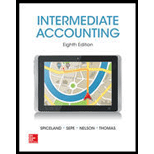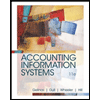
Real World Case 8–2
Physical quantities and costs included in inventory; Sport Chalet
• LO8–2
Real World Financials
Determining the physical quantity that should be included in inventory normally is a simple matter because that amount consists of items in the possession of the company. The cost of inventory includes all necessary expenditures to acquire the inventory and bring it to its desired condition and location for sale or for use in the manufacturing process.
Required:
1. Identify and describe the situations in which physical quantity included in inventory is more difficult than simply determining items in the possession of the company.
2. In addition to the direct acquisition costs such as the price paid and transportation costs to obtain inventory, what other expenditures might be necessary to bring the inventory to its desired condition and location?
3. Access EDGAR on the Internet. The web address is www.sec.gov. Search for Sport Chalet Inc., a leading operator of full-service, specialty sporting goods stores in California and Nevada. Access the 10-K filing for the most recent fiscal year. Search or scroll to find the disclosure notes (footnotes). What costs does Sport Chalet include in its inventory?
Want to see the full answer?
Check out a sample textbook solution
Chapter 8 Solutions
Intermediate Accounting w/ Annual Report; Connect Access Card
- Which financial statement shows a company’s financial position at a specific point in time?A. Income StatementB. Balance SheetC. Statement of Cash FlowsD. Statement of Retained Earningsarrow_forwardWhich account is closed at the end of the accounting period? A. Accumulated Depreciation B. Salaries Payable C. Service Revenue D. Retained Earnings need carrow_forwardWhich account is closed at the end of the accounting period?A. Accumulated DepreciationB. Salaries PayableC. Service RevenueD. Retained Earningsarrow_forward
- 12. Which account is closed at the end of the accounting period?A. Accumulated DepreciationB. Salaries PayableC. Service RevenueD. Retained Earningsneed helparrow_forward12. Which account is closed at the end of the accounting period?A. Accumulated DepreciationB. Salaries PayableC. Service RevenueD. Retained Earningsarrow_forwardWhich account is closed at the end of the accounting period?A. Accumulated DepreciationB. Salaries PayableC. Service RevenueD. Retained Earningsneed helparrow_forward
- Which account is closed at the end of the accounting period?A. Accumulated DepreciationB. Salaries PayableC. Service RevenueD. Retained Earningsarrow_forwardThe principle that requires companies to record expenses in the same period as the revenues they help generate is the:A. Revenue Recognition PrincipleB. Consistency PrincipleC. Matching PrincipleD. Cost Principleneed hekparrow_forwardNo AI The principle that requires companies to record expenses in the same period as the revenues they help generate is the:A. Revenue Recognition PrincipleB. Consistency PrincipleC. Matching PrincipleD. Cost Principlearrow_forward
- The principle that requires companies to record expenses in the same period as the revenues they help generate is the:A. Revenue Recognition PrincipleB. Consistency PrincipleC. Matching PrincipleD. Cost Principlearrow_forwardNo ai 14. A company receives a bill for electricity to be paid next month. What is the journal entry today?A. Debit Utilities Expense; Credit Accounts PayableB. Debit Cash; Credit Utilities ExpenseC. Debit Accounts Payable; Credit Utilities ExpenseD. No entry until payment is madearrow_forward14. A company receives a bill for electricity to be paid next month. What is the journal entry today?A. Debit Utilities Expense; Credit Accounts PayableB. Debit Cash; Credit Utilities ExpenseC. Debit Accounts Payable; Credit Utilities ExpenseD. No entry until payment is made i need helparrow_forward
 Accounting Information SystemsFinanceISBN:9781337552127Author:Ulric J. Gelinas, Richard B. Dull, Patrick Wheeler, Mary Callahan HillPublisher:Cengage Learning
Accounting Information SystemsFinanceISBN:9781337552127Author:Ulric J. Gelinas, Richard B. Dull, Patrick Wheeler, Mary Callahan HillPublisher:Cengage Learning Financial & Managerial AccountingAccountingISBN:9781285866307Author:Carl Warren, James M. Reeve, Jonathan DuchacPublisher:Cengage Learning
Financial & Managerial AccountingAccountingISBN:9781285866307Author:Carl Warren, James M. Reeve, Jonathan DuchacPublisher:Cengage Learning Corporate Financial AccountingAccountingISBN:9781305653535Author:Carl Warren, James M. Reeve, Jonathan DuchacPublisher:Cengage Learning
Corporate Financial AccountingAccountingISBN:9781305653535Author:Carl Warren, James M. Reeve, Jonathan DuchacPublisher:Cengage Learning Corporate Financial AccountingAccountingISBN:9781337398169Author:Carl Warren, Jeff JonesPublisher:Cengage Learning
Corporate Financial AccountingAccountingISBN:9781337398169Author:Carl Warren, Jeff JonesPublisher:Cengage Learning Financial & Managerial AccountingAccountingISBN:9781337119207Author:Carl Warren, James M. Reeve, Jonathan DuchacPublisher:Cengage Learning
Financial & Managerial AccountingAccountingISBN:9781337119207Author:Carl Warren, James M. Reeve, Jonathan DuchacPublisher:Cengage Learning




